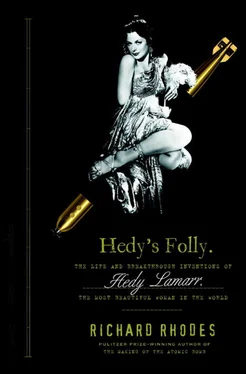Not only Berlin but also Vienna had been bleak. The war may not have affected Hedy Kiesler and her prosperous family; Boski, who had attended school in Vienna before beginning her university studies in Berlin, remembered an uglier reality. “When I went to school there,” she writes, “after the First World War, Vienna and Austria were really terribly beaten, losing the war, losing their emperor, losing the illusion that they were the center of the universe. They were terribly poor, everything was rationed, and you had to wait in line for the simplest necessities of life.”
Boski found Paris transforming:
Paris was like a carnival. I will never forget its busy ebullience on the early morning of our arrival: shops opened, housewives wearing slippers marketing, carrying shopping baskets for bread and milk, carts full of vegetables, noise, bustling, cheerful, sunny. We fell in love with it that instant… even though I was not too sure whether I had made the right decision coming to Paris with George. Not because it was “improper,” for we in our generation tried to kick over the conventional ideas. I was quite radically minded, quite believing in woman’s equal rights, fiercely believing in independence of spirit… and also slightly cynical about the world…. But George and Paris humanized me. I suddenly knew that just simply living can be fun.
Their first task was locating a place to live. Instead of consulting a realtor, they found Shakespeare and Company, Sylvia Beach’s bookstore at 12, rue de l’Odéon on the Left Bank near the Luxembourg Gardens. “I still don’t remember how we ever did get to Sylvia Beach’s bookshop in the first place,” Boski reminisced, “except that somehow within a week or two almost anyone interested or active in the arts did get to Shakespeare & Co.”
Sylvia Beach, the daughter of the pastor of the First Presbyterian Church of Princeton, New Jersey, had opened her bookstore in Paris at a different location in 1919 after serving with the Red Cross in Serbia during the Great War. She moved to the larger rue de l’Odéon location in 1921. An English and American expatriate community formed in Paris in the 1920s in response to a highly favorable exchange rate and a conviction like Antheil’s among artists and writers that their work would find more support abroad than at home. Perhaps because Beach maintained a rental library of books as well as sold them, perhaps because of her sympathy for struggling artists and writers—“she was kind, cheerful and interested, and loved to make jokes and gossip,” Ernest Hemingway remembered of her—her bookstore became the expatriate community’s lively center.
Besides Shakespeare and Company, Beach’s greatest contribution to the literary life of the day was undertaking to publish James Joyce’s controversial masterpiece Ulysses . She did so after the work had lost its American publisher. B. W. Huebsch, she wrote to a friend in 1921, “threw up the job in a fright” when an issue of the Greenwich Village journal the Little Review featuring a section of the book was declared obscene. Beach stepped in to save it, borrowing money from her family to publish it by subscription in Paris in regular and deluxe editions.
She had less luck locating a place for the Joyce family to live near Shakespeare and Company. “I tried my best to find an apartment for the Joyces,” she told their mutual friend Harriet Weaver, “but as they required six rooms at least and as Mr. Joyce insisted on being in the Odéon quarter or very near it, there was nothing that could be done. There is never an apartment to be had in this quarter and excepting some impossible streets far from the center there is nothing on the entire Left Bank.”
That hardly boded well for the newly arrived young lovers. “Sylvia and George immediately took a shine to each other,” however, Boski recalled, “not only because George was American, not only because Sylvia was interested in every kind of artistic endeavor… but also because George was a Trentonian (even though a refugee of, as Sylvia was a refugee of Princeton) and their vocabulary, their physical landscape of youth was the same.” Beach may have had an ulterior motive as well for helping Antheil; according to Bravig Imbs, another American expatriate who became a friend of the Antheils, the bookseller “was on the look-out for a talented composer, of course, having vague musical plans for James Joyce, and she intuitively recognized George’s sincerity and force.” If there was no apartment nearby for a family that required six rooms, there was an enclosed mezzanine directly above Beach’s bookstore—she had been using it as a storeroom—that might suit a young couple traveling light. Boski remembered that it “consisted of one room with a so-called cabinet de toilette with a washbasin and shelves for dishes and a gas ring. It was a heavenly place as far as we were concerned.” In those days, she said, “one went to the public baths, being careful to take along a bottle of Lysol, one’s own towels and a warm overcoat to wear when one got out of the hot bath.”
The Antheils, as they came to be, lived above Shakespeare and Company for more than ten years, expanding into two adjacent rooms when the American students to whom Beach rented them finished their studies and moved on. “George was a voracious reader,” Boski said, “he was a voracious worker too, and apart from our friendship with Sylvia, it was wonderful to be able to go downstairs and borrow any amount of books and exchange them at a moment’s notice. It helped me to learn English also.” George pointed her to detective stories, on the theory that searching out the clues hidden in the story would encourage her to use the dictionary to look up any unfamiliar words. “I was very shy about my not knowing English and I was the most taciturn little thing for over a year until I finally ventured to say a few words in English. I am sure a lot of George’s friends (who did not speak French which I spoke well) were surprised that the little Hungarian savage could talk.”
After attending the Les noces premiere on the night they arrived in Paris, 13 June 1923, George and Boski had gone backstage to congratulate Stravinsky on his new ballet. The Russian composer had invited them to visit him the next day at Pleyel’s, which Antheil calls “the great piano warehouse rooms where Chopin had often practiced.” Pleyel was an old-line piano manufacturer, the French counterpart to Steinway or Bösendorfer. Besides making concert pianos, Pleyel manufactured player pianos—the firm, punning on its name, called its model a Pleyela.
Player pianos, the entertainment centers of their day, brought music into homes in the half century before radio replaced them with a full menu of music and voice transmissions. The great advantage of the player piano was that it did not require piano lessons or years of practice to play, merely legs strong enough to pump the bellows that supplied the vacuum to actuate the works. The first player pianos had been cabinet players—Americans called them push-ups—large wooden cabinets that hunched over the keyboards of standard pianos and actually pressed the piano keys with felt-covered mechanical wooden fingers. Gradually, piano owners parted with their standard pianos and push-ups and replaced them with player pianos, which had internal mechanical workings, could be played mechanically or by hand, and took up much less space. By 1919, player pianos had become so popular in Europe and America that their production outnumbered the production of standard pianos.
Music to be performed on a player piano was recorded on a roll of tough paper. Technicians cut holes and slots into the paper roll by hand, following the notations on the sheet music. In operation, the roll was loaded onto spools in the player piano much as recording tape is wound reel to reel. Pumping the pedals then scrolled the punched paper over a row of vacuum ducts—small holes, one for each piano key, in a brass bar called a tracker bar that looked much like an extremely long harmonica. The spooling paper covered the tracker ducts, holding the mechanism behind them at rest, until a hole or slot in the paper allowed air to be sucked into the duct. A rubber tube connected the tracker duct to one of a series of valve chests. The air flowing from the tube into the valve chest activated a sequence of valves and bladders that drove up a pushrod that in turn actuated the piano key.
Читать дальше












